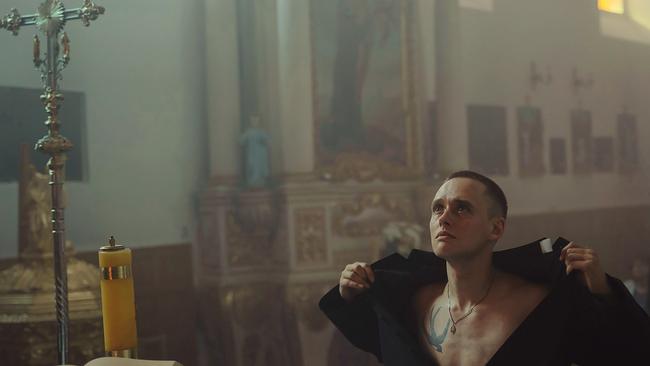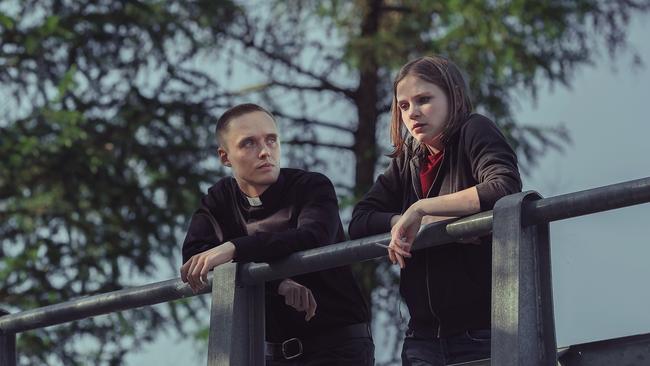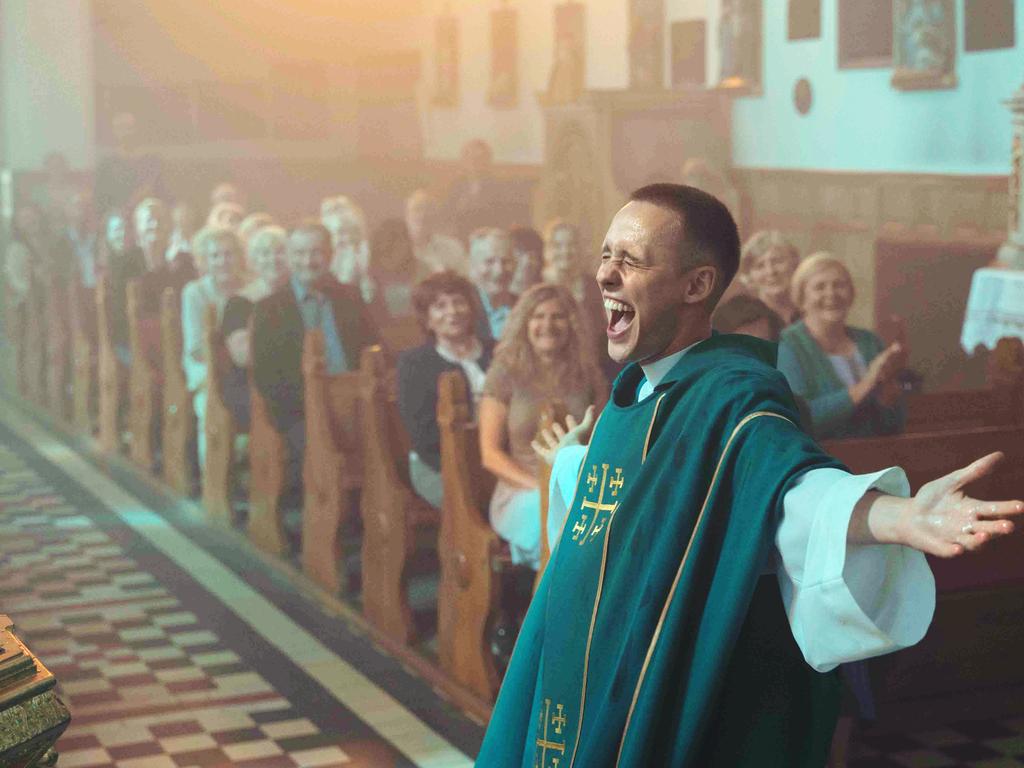Sex, drugs and the priesthood: Corpus Christi takes aim at Catholics
A new film shows what can happen when an interloper takes on a local Catholic church.

Sometimes directors have to fight for their actors. This was the case with Corpus Christi, an Oscar-nominated drama that features an intense, compelling central performance from Polish actor Bartosz Bielenia. He plays Daniel, a young man from a juvenile detention centre who manages to pass himself off as a priest in a rural village, with some startling consequences.
At first, says director Jan Komasa, the film’s producers were a little reluctant to consider Bielenia for the role. He was confident that the young actor had certain qualities that he wanted: “an amazing face, piercing gaze … he’s very self-aware, he understands how he looks and how it affects others. He’s super-intelligent. He had a hunger [for the role], and the capacity to pull it off.”
But the producers felt dubious, he says. Bielenia “is immersed in pop culture, and that’s why producers had a hard time at the beginning when I wanted him to play the main role. They were afraid he was too hipster, too intellectual. He’s very connected with Warsaw theatre troupe, one of the most progressive ones in Poland.” He came to an audition with long hair, an oversize sweater and boots. “He doesn’t look like a young criminal,” the producers told him.
For Komasa, that wasn’t a problem. The distance between the actor and the character was going to be fruitful. He was convinced that he would get a powerful performance from Bielenia. “My father is an actor, and I think I can sense sometimes the will to go to great lengths pursuing a role, and I felt it in him.” In the end, he says, he learned things about the character from Bielenia’s performance and his commitment to the part.
In a quiet, slow-build fashion, Corpus Christi is in part a thriller, a narrative of mysteries, unexpected twists and painful disclosures, haunted by the threat of violence and the possibility of exposure. There are also comic moments in Daniel’s acts of improvisation and deception; but Komasa doesn’t settle for easy resolutions or comforting outcomes.
The film opens at a juvenile detention centre, in a woodwork class. The figure of Daniel emerges from a group of detainees. He’s been told to act as the lookout for a carefully orchestrated bashing of a fellow inmate. The camera focuses, as it does throughout the film, on Daniel’s face. He has turned his back on the bashing, but there are flickers of recognition on his face, responding to what’s going on behind him.
“I wanted to create the sense that he’s complicit, that he’s in this heavy environment with strict rules, a closed hermetic circle,” Komasa says. He’s fascinated by communities large and small, and by the way they exclude and include.
The next scene shows us another aspect of Daniel. He’s part of a different group at the detention centre, taking part in a religious service, where he clearly feels at home and involved; he pays close attention to a sermon and leads the singing of a psalm. “Each of is the priest of Christ,” the priest tells this small congregation, and it’s an attitude that Daniel takes to heart.

Komasa wanted to juxtapose those two groups, these worlds in which Daniel has a place. Another aspect of the theme of community, he says, is “that sometimes, becoming a member of a group you lose a part of your individuality.” The film takes Daniel “from one group to another and then another,” losing aspects of himself, finding others,
We don’t know at the outset what Daniel has done or why he is in danger from one of the inmates. His faith appears to be sincere, and he seems to have a vocation. But his mentor, Father Tomasz (Lukasz Simlat), the priest at the detention centre, tells him that no one with a criminal background would be accepted at a seminary.
Daniel leaves the centre on parole, to take a job with other ex-prisoners at a sawmill in a remote part of the country. But before he starts work, circumstances lead him to pass himself off as a priest — almost on a whim, yet the impulse seems to go deeper than that. Suddenly, the imposture is no longer temporary. He’s asked to fill in for the ailing vicar at the village. And he agrees.
He finds himself taking confession, preaching sermons, catering to the community’s spiritual needs. He has to search on his mobile phone to find the language of the confessional, but he’s a quick learner, an adept improviser. In his unorthodox way, he’s very good at what he does. He ca n be a therapist of sorts, Komasa notes, with responses and solutions outside traditional religious remedies. Yet there are times when he takes issue with expectations, with the way people in power expect to use the church to advance their political or commercial agenda. And he’s also aware of the way religion can be used to exclude as well as include.
The religious background to the story is complex. Poland is “allegedly the fastest secularising country in the world”, Komasa says, but there’s still a strong conservative Catholic tradition in the country.
There were difficulties in finding a place to shoot the film, particularly when it came to scenes set inside the church. There were concerns not simply with the depiction of the Catholic Church, but also with scenes involving sex, drugs, alcohol and swearing.
The film is loosely inspired by a true story. There are examples In Poland (and elsewhere in the world) of people impersonating priests. Screenwriter Mateusz Pacewicz used a well-known case from 2011 as a starting point, researching the story of a young man who impersonated a priest during the festival of Corpus Christi. His intentions were benign, it seems; he wanted to help the people of a small village.
The filmmakers didn’t want to follow this story too closely, Komasa says, for a range of reasons, including concerns for those taken in by the imposture. “We were worried about the community, who felt betrayed. It’s a complex issue.” When he came on board, Pacewicz’s script was “already a mesmerising work in and of itself”. Komasa introduced a few new elements that took the story further away from the original circumstances.
The movie gives Daniel a backstory, and creates a defining incident for the village, an event from the past that has left some in the community in a cycle of sorrow and hate, mourning and loss, memorialising victims and assigning blame in a vindictive fashion, but leaving issues unresolved. Daniel starts to dig deeper into the story, and bring uncomfortable truths to the surface. At the same time, he’s at risk; he has things to fear from the re-examination of the past or of appearances being tested.
His background made him paradoxically appropriate for the role he assumed, one that he was considered inappropriate to take. His personal qualities added something further.
“He had already broken every commandment, he knew it all,” Komasa says, “I wouldn’t say it was a piece of cake,” but Daniel had a better understanding of people’s needs than the average seminarian, he suggests. “The office makes you a priest, but he is naturally a shepherd, and someone who wants to listen.”
Corpus Christi is currently screening nationally.


To join the conversation, please log in. Don't have an account? Register
Join the conversation, you are commenting as Logout